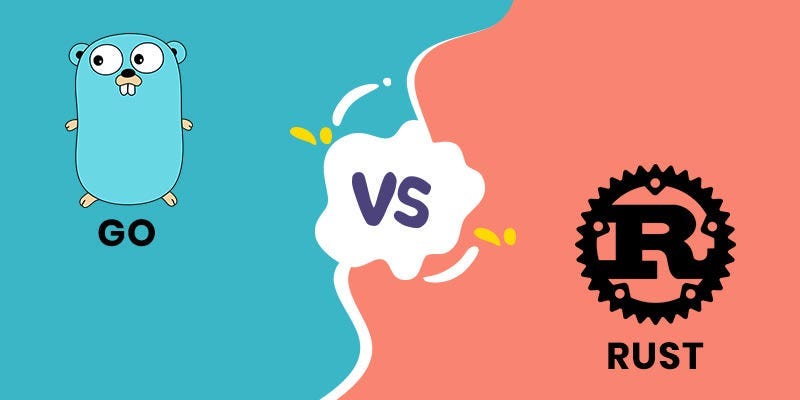
This topic has bothered me for a while as a Go developer, and I’ve been learning Rust for a while and have this article written as part of my research.
Rust and Go are both modern programming languages that have gained popularity for their focus on performance and reliability. However, they have different design philosophies and use cases. Here are some key differences:
Memory Safety:
Rust has a unique feature called ownership with a borrow checker that ensures memory safety without a garbage collector. This makes Rust ideal for systems programming and other scenarios where fine control over memory is required.
Go, on the other hand, uses a garbage collector for memory management. This can simplify development but may not be suitable for low-level tasks where manual memory management is needed.
Error Handling:
Rust uses a mechanism called Result for error handling, which requires explicit handling of all possible error conditions. This can lead to safer code, but it can also make the code more verbose.
Go uses a multiple return values pattern for error handling, which is simpler and less verbose, but it’s also easy to ignore errors accidentally.
Concurrency:
Go has built-in support for lightweight concurrent processes (goroutines), and communication between these processes is handled by channels. This makes Go a great choice for network programming and other I/O-bound tasks.
Rust also supports concurrency but does not have built-in primitives like goroutines or channels. Instead, it offers a variety of concurrency models through libraries.
Interoperability:
Rust provides excellent interoperability with C and can be used to write safe bindings to C libraries.
Go can also interoperate with C using cgo, but it’s not as seamless as in Rust and can impact performance and cross-compilation.
Tooling:
Both languages have excellent tooling. Rust’s package manager and build system, Cargo, is often praised for its ease of use. Go also has a simple and effective toolchain, and its build system requires no separate configuration file like Cargo.toml in Rust.
Syntax:
Rust’s syntax is more similar to C++, with a focus on explicitness and readability. Go’s syntax is simpler, which can make the language easier to learn and read.
Use Cases:
Rust:
Systems Programming: Rust’s control over system resources makes it ideal for low-level systems programming. It’s being used to build game engines, operating systems, browser components, and more.
WebAssembly: Rust has strong support for WebAssembly, a binary format for executing code at near-native speed in web browsers. This makes Rust a good choice for high-performance web applications.
Embedded Systems: Rust’s no-overhead abstractions and fine control over memory make it a good choice for programming embedded systems, where resources are limited and efficiency is critical.
Game Development: Rust’s performance characteristics and safety features make it a promising language for game development. There are already several game engines written in Rust.
Go:
Web Development: Go’s simplicity and strong support for concurrent programming make it a great choice for web development. It’s often used to build APIs and web servers.
Networking: Go’s standard library has excellent support for network programming, making it a good choice for building network tools and servers.
Cloud Infrastructure: Go is often used in the field of cloud computing and has been used to build many of the tools and systems that power the modern web, including Docker, Kubernetes, and Terraform.
DevOps Tools: Go’s simplicity, cross-platform support, and ability to produce static binaries with no external dependencies make it a popular choice for building DevOps tools.
Companies that use Rust and Go:
Companies using Rust:
Mozilla: Rust was originally sponsored by Mozilla and is used in components of the Firefox browser.
Dropbox: Dropbox uses Rust for several components of their backend infrastructure.
Cloudflare: Cloudflare uses Rust in their edge computing platform, as well as for other system-level tools.
Microsoft: Microsoft has been increasingly adopting Rust for system-level components in Windows and Azure.
Amazon Web Services (AWS): AWS uses Rust in performance-sensitive components of their services, and they sponsor the Rust project.
Companies using Go:
Google: Go was developed at Google, and it’s used in many of Google’s internal systems and projects, including Kubernetes and gVisor.
Uber: Uber uses Go extensively in their microservice architecture.
Docker: Docker, the popular containerization platform, is written in Go.
Dropbox: Dropbox migrated much of their backend infrastructure from Python to Go for performance reasons.
Twitch: Twitch uses Go for many of their backend systems and real-time services.